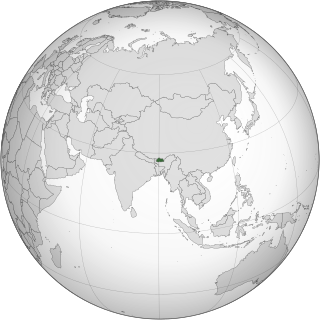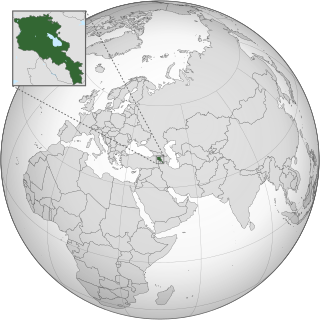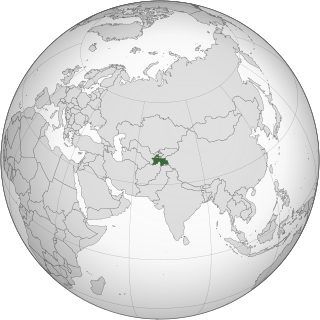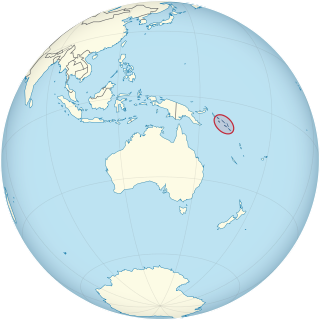Related Research Articles

Cannabis is legal in Uruguay, and is one of the most widely used drugs in the nation.

Cannabis is illegal in Nigeria, yet the country is a major source of West African-grown cannabis, and ranked the world's third highest consumer of cannabis.
Cannabis in Namibia is illegal for recreational and medicinal uses, but cannabis, just like mandrax (methaqualone), are the most popular illicit drugs in the country. Cannabis also has a history of use as a traditional medicine by local indigenous communities. Per the 2011 UNODC report, the incidence of annual cannabis usage in Namibia was 3.9% as of 2000.
Cannabis in Comoros is currently illegal as of September 2019. Between January 1975 and May 1978, cannabis in Comoros was legal, legalized by president Ali Soilih.
Cannabis in Dominica is a Class B drug to cultivate, sell or possess. This means that possession is punishable by 12 months and EC$12,000 (summary) or 2 years and EC$20,000. Supplying, production, or importation are punishable by 3 years and EC$100,000 (summary) or 14 years and EC$200,000.

Cannabis in Bhutan is illegal, but grows prolifically in the country and has multiple traditional uses, such as feeding pigs and producing textiles.
Cannabis in Grenada is illegal. Cannabis possession is the most common drug offense on the island, and the annual prevalence of cannabis use amongst adults was reported as 10.8% in 2005.

Cannabis in Armenia is illegal for all uses.
Cannabis in Martinique is illegal, but is illicitly produced and transported on the island. Some cannabis is grown locally on Martinique, but appears to be mostly for local consumption and has little impact on the larger drug market.
Cannabis in Montserrat, the British Overseas Territory in the Caribbean Leeward Islands, is illegal under British law.

White Widow is a balanced hybrid strain of Cannabis indica and Cannabis sativa that was created and developed by Shantibaba whilst he worked at the Greenhouse Seed Company.
Cannabis in Saint Lucia is legal, up to 30 grams. Cannabis is the only drug grown locally on Saint Lucia, and meets 20% of the local demand, with the remainder coming from the other Caribbean islands, predominantly Jamaica and Saint Vincent, and more developed countries such as the United States. Also, a significant portion is shipped from countries in South America such as Columbia and Venezuela.
Cannabis in Liechtenstein is illegal with severe penalties for the production, sale, and possession of marijuana for medicinal or recreational purposes.
Cannabis in Monaco is illegal. The production, sale, and possession of marijuana for medicinal or recreational purposes being a criminal offense with a penalty of up to one year in jail in addition to a fine of up to €1680. Despite the strong laws, the police and courts are often lenient, letting offenders off with a warning.
Cannabis in Djibouti is illegal with penalties for the production, sale, and possession of marijuana for medicinal or recreational purposes. Offenders may be fined or receive up to five years in prison. Use of cannabis in Djibouti is low due to poor conditions for cultivation and the local preference for the legal drug khat.

Cannabis in Tajikistan is illegal with severe penalties for the production, sale, and possession of marijuana for medicinal or recreational purposes. Punishments include up to five years in prison for possession and capital punishment or 25-year sentence for sale.
Cannabis in Eritrea is illegal with severe penalties for the production, sale, and possession of marijuana for medicinal or recreational purposes. Offenders are imprisoned up to twelve months and fined up to 50'000 Nkf for possession. Conditions for cultivation in Eritrea are poor.

Cannabis in Kiribati is illegal with severe punishments for the production, sale, and possession of marijuana for medicinal or recreational purposes. A 2011 survey of young people, found that 6.8% of males and 1.6% of females had ever used cannabis.

The production, sale and possession of cannabis for medicinal or recreational purposes is illegal in the Solomon Islands. Offenders receive a fine of up to $100,000 or imprisonment for up to ten years. A 2011 survey of young people found that 16.1% of males and 11.1% of females had ever used cannabis.
References
- ↑ "Legal status of cannabis in Haiti - Cannaconnection.com". www.cannaconnection.com. Retrieved 2020-04-27.
- ↑ World Drug Report 2011. United Nations Office on Drugs and Crime (UNODC). Cannabis stats are from Chapter 6.1.1.3. Consumption: Annual prevalence of Cannabis, p. 217. "Sources: Annual Reports Questionnaires, Academic Researches, Concise International Chemical Assessment Documents (CICAD), Government Reports, European School Survey Project on Alcohol and Other Drugs (ESPAD), International Narcotics Control Strategy Reports (INCSR)."